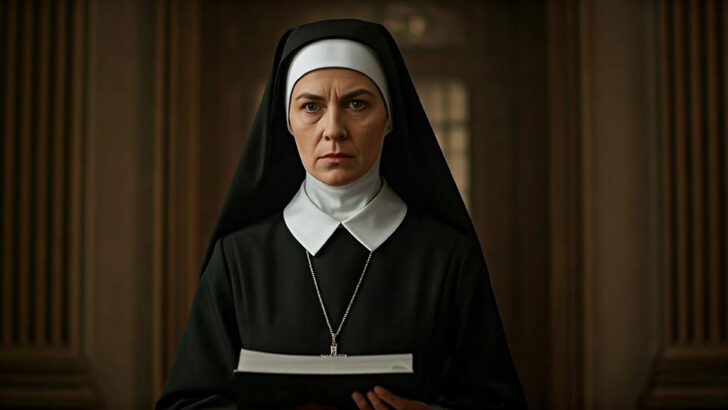Like many readers of this paper I grew up in an era where the depiction of nuns on screen was generally positive. I’m talking about films like Heaven Knows, Mr Allison (1957), The Bells of Saint Marys (1945), Black Narcissus (1947) and so on.
I once wrote in these pages of an interview I conducted with Audrey Hepburn where she told me her most challenging role was in The Nun’s Story in 1959. Her character leaves her order at the end of the film. This was unusual for the time. As Bob Dylan said, the times they were a-changing.
In the sixties different laws applied. We had comedies like The Singing Nun (1961). In The Sound of Music (1965) Julie Andrews, like Audrey Hepburn a few years before, also left her order.
Shift
The mood, however, was still upbeat. It took later decades for what are now called “nunsploitation” movies to come onstream.
One of the first signs of a ‘revisionist’ approach to nuns that I noticed was in the 1985 feature, Agnes of God, featuring a theme of mental illness. In more recent times we’ve had a more ominous strain, what with films like The Bad Nun in 2018 and other offerings like The Nun (2013) and the gory, zombie-laden Nundead (2023). Prey for the Devil (2022) featured an exorcism theme. Deliver Us (2023) had a twisted ‘immaculate conception’ one.
People were once afraid to speak out against the Church. Now they’re afraid to speak out in favour of it”
Films mirror the way people think. We often hear about how clerical abuses were covered up in the past and how the authorities colluded in this. Perhaps a culture of conformity exists in all eras. My generation could have been accused of having an “ostrich” mentality when it came to such abuses but in recent decades we seem to have gone to the other extreme.
People were once afraid to speak out against the Church. Now they’re afraid to speak out in favour of it.
The fall-out from this is that nuns who’ve given their lives to helping others now see themselves and their orders being misrepresented on screen in a manner that seems to brook no resistance. It’s taken as ‘read’ that the events being displayed on celluloid are ‘gospel’, even when we’re dealing with genres that are blatantly satirical or irreverent in an obnoxious manner.
Comedies involving men disguised as nuns, like the 1990 Robbie Coltrane frolic Nuns on the Run, or the highly successful Whoopi Goldberg film Sister Act and its sequel, were innocuous. Contemporary comedies involving nuns, on the contrary, tend to be darker affairs. Alongside black comedies we’re proferred apocryphal rituals, skewed exorcisms, sacrilegious excesses.
The film industry doesn’t apologise for this. It’s almost deemed to be a ‘fair’ reaction to a past that can’t be forgiven or forgotten. The debt of history, in other words, is being repaid with interest.
Strain
In such a scenario, little empathy is shown for philanthropic nuns who’ve lived their lives in the service of their communities. Now elderly, they’re called upon to suffer the slings and arrows of outrageous footage with impunity.
I recently wrote here about the frosty depiction of the nuns in the Cillian Murphy film Small Things Like These, most particularly the rather creepy Mother Superior played by Emily Watson. Few people batted an eyelid at this. It was almost as if it was expected – the ‘new normal’.
There are oases in this liturgical desert but it’s a long time since Susan Sarandon won an Oscar for her portrayal of Sr Helen Prejean in ‘Dead Man Walking’”
It isn’t just nuns who are being targeted in this regard. The strain also applies to priests, and to the Church in general. But a plethora of films involving nuns in recent times have lent credence to the feeling that they’re being particularly singled out, especially in horror movies, movies about demonic possession, and even pregnancy.
There’s no need to go into the particular plotlines of films like Dark Nuns (2025), The First Omen (2024) or The Nun (2018) and its two sequels. There’s also Saint Agatha (2018), which had murky convent goings-on, Sister Death (2023), a supernatural horror feature from 2017, The Little Hours, featuring emotionally unstable nuns, Little Sister, and many others, like Warrior Nun, currently showing on Netflix.
There are oases in this liturgical desert but it’s a long time since Susan Sarandon won an Oscar for her portrayal of Sr Helen Prejean in Dead Man Walking. In more recent times we’ve had Pawel Pawlikowski’s very powerful Ida. This Polish feature had sexual content which would probably not have been permissible in a previous era but it was generally favourable to the Church.
Novitiate had a strict Reverend Mother but a sensitive and moving portrayal of a postulant. There was also Therese of Lisieux, Cabrini, and Immaculate.
These seem to be the exceptions to prove the rule.


 Aubrey Malone
Aubrey Malone
